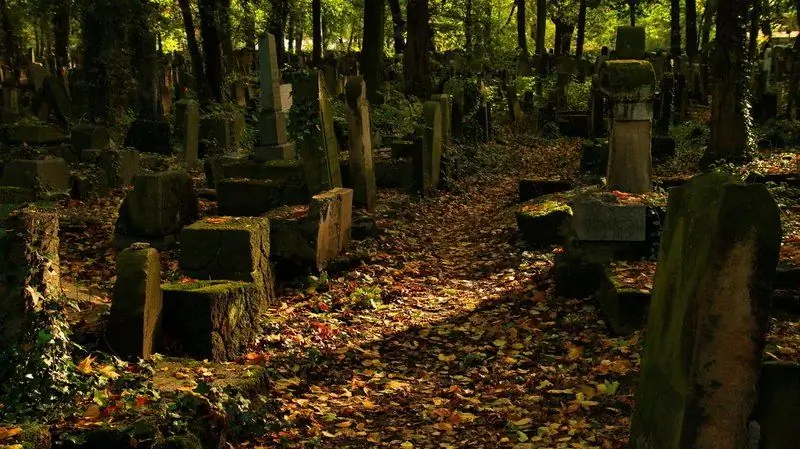
Table of contents:
- Author Bailey Albertson albertson@usefultipsdiy.com.
- Public 2023-12-17 12:53.
- Last modified 2025-01-23 12:41.
Why Christians Can't Say "Let the Earth Rest in Peace"

Few Orthodox know why it is impossible to say “Let the earth rest in peace” when remembering a deceased person. This phrase expresses grief for the past and many people use it, not knowing that it contradicts all Christian dogmas.
Origin of the phrase
This expression appeared in pagan times, when people believed that the soul does not part with the body after the death of a person. Therefore, it was the body of the deceased who received all sorts of honors and provided comfort: chic tombs were built, in which clothes, weapons, jewelry were placed. Somewhere there was even a custom to bury his wives, servants, slaves, dogs, horses with the deceased. The pagans also believed that the earth could put pressure on the body of the deceased, therefore, saying goodbye to him, they wished him "rest in peace."
Often the expression “let the earth rest in peace” was also used in ancient times. Then it meant wishing the deceased an easy afterlife, in the existence of which the people of that era believed. Ancient Roman gravestones have survived, on which this expression is engraved in several variations as an epitaph:
- STTL is an abbreviation of the Latin phrase "Sit tibi terra levis", which means "May the earth rest in peace."
- TLS - "Terra levis sit", translated "Let the earth be in peace."
- SETL - "Sit ei terra levis", meaning "May this earth rest in peace."

In the photo there is a fragment of an ancient Roman tombstone, on which the words "Sit tibi terra levis" can be distinguished
Some of the researchers are confident in the use of this phrase in ancient Rome as a curse on a dead enemy. Saying "earth in peace", they wished a person that there would be no traces left of him either in the earth or in the memory of descendants.
Why "Let the earth rest in peace" should not be said by an Orthodox person
This often used phrase is contrary to Christian culture, according to which the soul of a person after death leaves the body and ascends to heaven. In the Orthodox religion, the soul dominates the mortal physical shell, and belief in its immortality is shown by conducting a funeral service and other Christian funeral rites. Therefore, any wishes for the body have nothing to do with the state of the soul of the deceased.

Therefore, one should not strive to richly decorate the grave, to bury any valuables with the deceased, just as one should not wish him "rest in peace." It will be much more useful to honor his memory with prayer and memorial services. When remembering the deceased, it would be more correct to use another expression - to wish him the Kingdom of Heaven.
Recommended:
Why You Can't Look In The Mirror When You Cry

Superstitions regarding tears in front of a mirror. Where did they go, logical explanation
Good Day: Why Can't You Talk Like That

Is it permissible to greet the interlocutor orally or in correspondence with the phrase "Good day." What arguments do linguists have on this score?
Why You Can't Why You Can't Wash Floors On Friday: Signs And Facts

Why you can't wash floors on Friday: signs and superstitions. The opinion of the mystics and Orthodoxy
Why You Can't Step On Graves In A Cemetery And What Will Happen If You Break The Ban

Why you can't step on graves in a cemetery: superstition, church opinion, and rational reasons
Why Women Talk More Than Men

The reasons why women are much more talkative than the stronger sex
